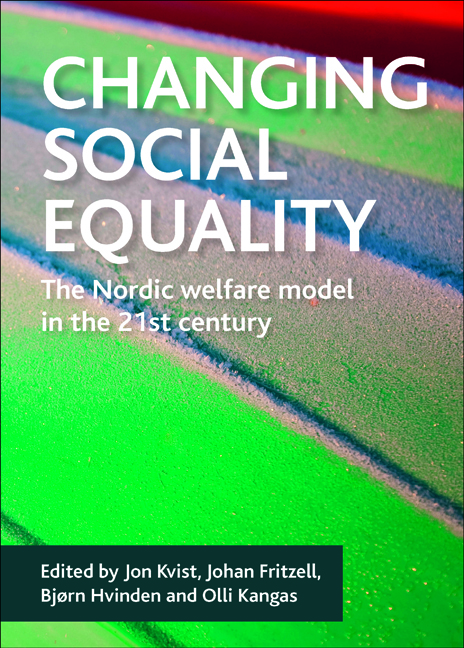Book contents
- Frontmatter
- Contents
- List of tables and figures
- Notes on contributors
- Acknowledgements
- one Changing social inequality and the Nordic welfare model
- two Anti-immigration attitudes, support for redistribution and party choice in Europe
- three Do we all (dis)like the same welfare state? Configurations of public support for the welfare state in comparative perspective
- four Eroding minimum income protection in the Nordic countries? Reassessing the Nordic model of social assistance
- five Equality in the social service state: Nordic childcare models in comparative perspective
- six Welfare state institutions, unemployment and poverty: comparative analysis of unemployment benefits and labour market participation in 15 European Union countries
- seven Social inequalities in health: the Nordic welfare state in a comparative context
- eight Income inequality and poverty: do the Nordic countries still constitute a family of their own?
- nine Is immigration challenging the economic sustainability of the Nordic welfare model?
- ten Nordic responses to rising inequalities: still pursuing a distinct path or joining the rest?
- Index
three - Do we all (dis)like the same welfare state? Configurations of public support for the welfare state in comparative perspective
Published online by Cambridge University Press: 01 September 2022
- Frontmatter
- Contents
- List of tables and figures
- Notes on contributors
- Acknowledgements
- one Changing social inequality and the Nordic welfare model
- two Anti-immigration attitudes, support for redistribution and party choice in Europe
- three Do we all (dis)like the same welfare state? Configurations of public support for the welfare state in comparative perspective
- four Eroding minimum income protection in the Nordic countries? Reassessing the Nordic model of social assistance
- five Equality in the social service state: Nordic childcare models in comparative perspective
- six Welfare state institutions, unemployment and poverty: comparative analysis of unemployment benefits and labour market participation in 15 European Union countries
- seven Social inequalities in health: the Nordic welfare state in a comparative context
- eight Income inequality and poverty: do the Nordic countries still constitute a family of their own?
- nine Is immigration challenging the economic sustainability of the Nordic welfare model?
- ten Nordic responses to rising inequalities: still pursuing a distinct path or joining the rest?
- Index
Summary
Introduction
Does equality in outcomes lead to a preference for equality? Compared to other OECD (Organisation for Economic Co-operation and Development) countries, the Nordic countries have welfare systems characterised by high levels of redistribution, universal coverage and generous cash benefits and social services. This welfare state architecture has resulted in high levels of equality in socioeconomic and social outcomes. However, while conventional wisdom has it that the populations in the Nordic countries have ‘a passion for equality’ that matches the high level of actual equality, results from comparative research on welfare attitudes suggest otherwise. Indeed, when compared to other OECD countries, the populations in the Nordic countries do not stand out in terms of their support for redistribution and other core welfare state functions (see, for example, Coughlin, 1980; Svallfors, 1997, 1999, 2003, 2006; Gelissen, 2000; Andress and Heien, 2001; Arts and Gelissen, 2001; Blekesaune and Quadagno, 2003; Linos and West, 2003; Lipsmeyer and Nordstrom, 2003; Mehrtens, 2004; Fraile and Ferrer, 2005; Jæger, 2006a, 2006b, 2009; Pfeifer, 2009).
What might explain why the populations in the Nordic countries are less supportive of the welfare state than we would expect? First, findings from existing comparative research may be correct: the populations in the Nordic countries are not more supportive of the welfare state than others. Second, existing empirical research may measure support for the welfare state in a manner insufficiently detailed for capturing the presumed Nordic passion for equality. This second scenario calls for a more comprehensive approach to measuring welfare state support.
In this chapter I address the second point by proposing a new approach to measuring public support for the welfare state that addresses two limitations in previous research. The first limitation is that most studies analyse single dimensions of welfare attitudes such as deservingness criteria (see, for example, van Oorschot, 2000; Jæger, 2007; Larsen, 2008), income redistribution (see, for example, Svallfors, 1997; Linos and West, 2003), or attitudes towards specific welfare programmes (see, for example, Nordlund, 1997; Edlund, 1999). Consequently, most studies do not consider the interrelatedness between different attitudinal dimensions and in so doing, may have failed to identify a particular Nordic configuration of welfare attitudes (if indeed such a configuration exists).
- Type
- Chapter
- Information
- Changing Social EqualityThe Nordic Welfare Model in the 21st Century, pp. 45 - 68Publisher: Bristol University PressPrint publication year: 2011



